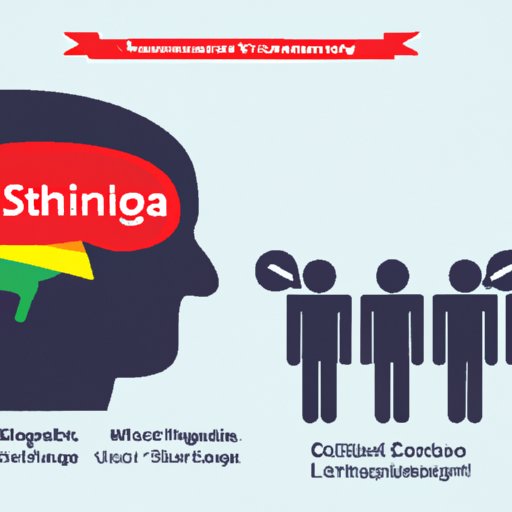Introduction
Stigma is a form of prejudice that exists in all societies, and its impact on mental health can be profound. It is defined as a mark of disgrace or disapproval that is socially attached to an individual or group of individuals. This article explores how stigma affects mental health, examining the different types of stigma, their psychological effects, and the role of social support in countering mental health stigma. It also looks at the link between stigma and mental health service utilization.

Examining the Different Types of Stigma and its Impact on Mental Health
Stigma can take many forms, including internalized stigma, perceived stigma, and self-stigma. Internalized stigma occurs when an individual internalizes negative attitudes and beliefs about themselves, leading to feelings of shame and inadequacy. Perceived stigma is the belief that others are judging them negatively due to their mental illness. Self-stigma refers to the tendency of individuals to view themselves more harshly than they would if they did not have a mental illness.
How Negative Perceptions Contribute to Poor Mental Health Outcomes
Negative perceptions of mental illness can lead to social isolation, low self-esteem, and difficulty accessing resources. Social isolation is a common result of stigma, as individuals may feel too ashamed or embarrassed to reach out for help or engage in social activities. Low self-esteem can also occur as a result of stigma, as individuals may feel like they are less worthy or capable due to their mental illness. Finally, difficulty accessing resources is a common outcome of stigma, as individuals may fear judgment or rejection from healthcare providers or other services.

Exploring the Psychological Effects of Stigma on Mental Health
The psychological effects of stigma on mental health can be significant. Anxiety is a common reaction to stigma, as individuals may fear being judged or rejected by others. Depression can also occur, as individuals may feel hopeless or helpless in the face of stigma. Posttraumatic stress disorder (PTSD) can also develop as a result of stigma, as individuals may experience flashbacks or intrusive memories related to past experiences of stigma.

The Intersection of Mental Illness and Stigma in Society
Stigma can manifest itself in many forms in society, including discrimination, prejudice, and stereotyping. Discrimination occurs when individuals are treated differently or unfairly due to their mental illness. Prejudice is a set of negative attitudes and beliefs about a particular group of people, and it can lead to discrimination. Stereotyping is a form of prejudice in which individuals are assumed to have certain characteristics based on their mental illness.
Analyzing the Role of Social Support in Counteracting Mental Health Stigma
Social support can play an important role in countering mental health stigma. Friends and family can provide a safe space for individuals to talk about their mental health without fear of judgment or rejection. Professional support groups can also provide a sense of community and understanding for individuals struggling with mental illness. Online communities can offer an additional layer of support and connection, allowing individuals to find comfort and solidarity in a virtual setting.
Understanding the Link Between Stigma and Mental Health Service Utilization
Stigma can be a major barrier to accessing mental health services. Individuals may experience fear of rejection, lack of motivation, or even financial barriers to care. These barriers can lead to delays or avoidance of seeking treatment, resulting in poorer mental health outcomes. Additionally, individuals may be reluctant to disclose their mental health status due to fear of judgment or discrimination.
Conclusion
This article has explored how stigma affects mental health, examining the different types of stigma and their psychological effects, as well as the role of social support in countering mental health stigma. It has also looked at the link between stigma and mental health service utilization. It is clear that stigma can have a profound effect on mental health, and it is essential that we continue to educate ourselves on the issue in order to reduce its impact.
It is important to recognize that stigma is a societal problem that requires collective action. We must work together to create a more inclusive and compassionate society in which individuals with mental illness can find acceptance and support. By increasing awareness of the issue and advocating for change, we can help reduce the stigma surrounding mental illness and improve mental health outcomes.
(Note: Is this article not meeting your expectations? Do you have knowledge or insights to share? Unlock new opportunities and expand your reach by joining our authors team. Click Registration to join us and share your expertise with our readers.)
